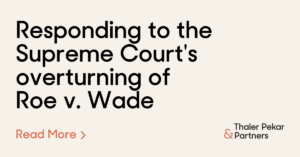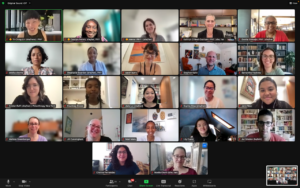2 min read
The Urgency of Listening to Now

This piece was originally published in 2020 on Medium.
What does work mean to you?
My own complex answer to this simple question surprised me. And I imagine yesterday’s answer differed from the one I would have given three months ago.
Can you say you know how your employees and colleagues will answer that question today?
Do you have a sense of how your employees are assigning meaning to what is now happening inside your institution? Or how your colleagues’ sense of meaning differs from yours?
It’s important that you do. Your future rests on the present. Transformation, innovation, and progress will depend upon how much you listen now.
This liminal time is paramount. In the current gap between ambiguity and possibility, listening is the best form of communication. Only by inviting people to be heard and listening to what they say can you navigate from confusion to coherence and from skepticism to trust.
Both institutionally and individually, we must understand where we are now before we can project where we are going. Future success will only be as solid as our grasp of the present.
Listening is an investment in interest and attention. And it may be difficult to find the time and space to focus on intentional listening right now. But the rewards will be profound.
Guide Dogs for the Blind understood the importance of listening to their stakeholders at a time of upheaval, when most staff and dogs are off campus. Board members and 35 staff members called 995 donors! Of course, Guide Dogs for the Blind staff will always speak with a donor. But, as Tom Horton, Vice President of Philanthropy at Guide Dogs for the Blind, said, “Never before had we had the opportunity to deliberately listen to so many of them.
“With the pandemic stopping all of our plans in their tracks, it gave us pause to reflect and turn our attention to the large family of donors who had been attracted to our mission since its inception 78 years ago. ‘Gratitude’ became the defining word. Gratitude for all those that had been there with us through thick and thin, in good economic times and bad, attending events and giving generously, and supporting our many programs.
“The outreach to listen, learn, and appreciate those who support our mission has definitely helped strengthen our culture.”
Listen to the people you’re not used to listening to. Innovation and change happen at the margins. Listen, especially, to the people who too often appear at the margins. Leadership is a willingness to hear the quiet things.
Only by listening can you discover all that is being disrupted — and what is being strengthened and created. You are leading at a time of significant change and making a lot of critical decisions. Only by listening can you make sure you are making them fully informed.
Listen for insight on what is working for your people. On what is surprising them. How have networks changed? What new networks are emerging? Who and what are now enabling things getting accomplished? From where and whom is innovation emerging?
Might people be developing a new sense of themselves their coworkers — and of possibilities? Might there be a different sense of belonging?
Kim James, head of Events and Partnerships at Waggl, “an agile employee voice platform”, told me, “One thing we are hearing is that listening is no longer considered a ‘nice to have’ warm and fuzzy thing. It’s a ‘must have’ for organizations that want to navigate through this period of ‘constant change’ and come out on the other side.” In fact, in a recent Waggl webinar, Dave Mowers, Global Director for People Engagement at the global law firm White and Case, said employees were recently asked, “What are we learning that we can bring back?”
Listen for the stories that are now grounding your people. Listen for the stories that are providing resilience in the face of ambiguity, and sensemaking in the face of complexity and volatility. How do current experiences provide insight into future possibilities?
We must listen now, before the small and nuanced details are forgotten or dismissed. By asking for and listening to stories now, we allow people to pause, make sense of what they are thinking and hearing, and to be heard.
Listen, too, for what your people are taking from listening to you. You’ve likely been issuing statements and letters, if not giving speeches. But we can be so eager to deploy persuasive messages that we forget to listen. Your ultimate message is determined by your listener. What are they understanding?
How we talk about and listen to what is happening now will determine what happens later. And you can’t co-create the future without understanding the present. Imagine the tension and consequences of moving forward having missed out on what is truly happening now!
Thaler Pekar & Partners is internationally-recognized for its deep expertise in narrative, story, and communication. Both the BBC and the Smithsonian Institution have hailed the founder, Thaler Pekar, as one of the world’s leading experts on institutional storytelling.
For 14 years, the team at Thaler Pekar & Partners has advised visionaries on being understood and influential. Our trademarked communication processes — Heart, Head, & Hand®, Engagement Equation® and Invitational Incline® — provide leaders with the confidence to speak, listen, and be heard, and sustain them in offering effective motivation. As a result, teams are more productive, audiences are more receptive, and visibility increases.
Our award-winning work ranges from gathering 178 oral histories across four continents and six countries for Chuck Feeney’s The Atlantic Philanthropies; to finding and refining stories about integrity for Novartis senior leadership; to coaching a mainstage TED Talker; and to developing a communication and story skills academy for L’Oreál International Educators and Customer Representatives.







